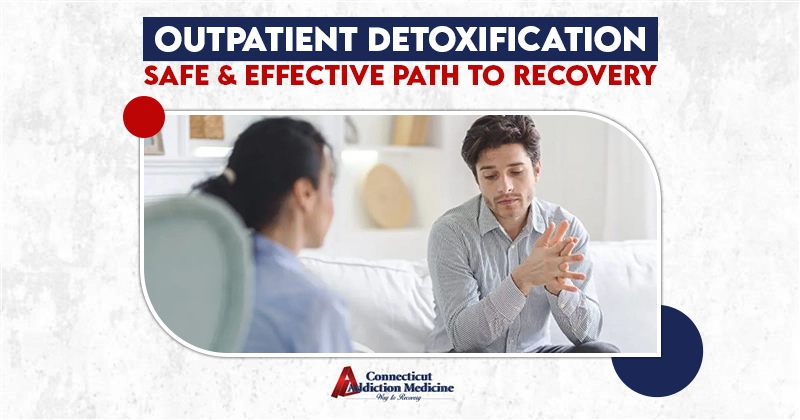Outpatient detoxification is withdrawal from alcohol, opioids, or other substances while under medical observation and remains in the home of the patient.
For many who are experiencing a chemical dependency issue with alcohol or drugs, beginning recovery can be overwhelming. Outpatient detox is usually the first and most beneficial step.
In an outpatient treatment scenario, people receive expert care, regular visits, and individually designed strategies specific to their needs. The approach reduces stigma and obstacles that may prevent people from gaining access to care.
CT Addiction Medicine is an integral part of supporting individuals through this process. The center makes sure detox is not only safe, but also builds a strong base for future recovery.
Key Features of Outpatient Detox:
- Medical monitoring without overnight stay.
- Regular visits to doctors, nurses, or therapists.
- Prescribed medications to manage withdrawal.
- Counseling and therapy sessions.
- Support for relapse prevention.
Outpatient Detoxification vs. Inpatient Detoxification
| Feature | Outpatient Detoxification | Inpatient Detoxification |
| Living arrangements | Stay at home | Stay at facility 24/7 |
| Cost | Lower | Higher |
| Flexibility | Can continue work/school | Requires full-time stay |
| Medical supervision | Regular check-ins | Continuous monitoring |
| Privacy | More private | Less privacy |
Outpatient Alcohol Detoxification
Outpatient alcohol detoxification is designed for individuals struggling with alcohol use disorder. Outpatient alcohol detoxification ensures that patients benefit from physician medical supervision of withdrawal, access to counseling services, and overall safe withdrawal management.
Why outpatient alcohol detoxification?
- Potential option of using medications such as benzodiazepines or naltrexone.
- Continuous monitoring so they do not develop serious withdrawal symptoms.
- Psychotherapy sessions to process emotional triggers and underlying issues.
Patients are able to manage cravings while engaging in the multiple responsibilities of daily life.
Outpatient Detoxification Services
Outpatient detoxification services cover a wide range of treatment options depending on the patient’s needs. These include:
- Medical assessments and treatment planning.
- Medication-assisted detox.
- Therapy and counseling.
- Family education and support.
- Relapse prevention strategies.
The goal of these services is not only to manage withdrawal but also to prepare patients for long-term recovery.
Outpatient Opioid Detoxification
Outpatient opioid detoxification is among the most utilized services currently offered due to the opioid epidemic. This service includes medications that can be monitored and prescribed, such as buprenorphine or methadone
For a person seeking freedom and independence, yet also having some professional support, this option is ideal.
The Process of Outpatient Detoxification
Initial Assessment
A detailed medical and psychological evaluation is performed.
Personalized Plan
Doctors design a detox plan based on substance use history.
Medical Supervision
Patients visit clinics regularly for monitoring.
Therapy Sessions
Counseling addresses emotional and behavioral issues.
Relapse Prevention
Patients learn strategies to avoid triggers and maintain sobriety.
Challenges of Outpatient Detoxification
- Risk of relapse due to exposure to triggers.
- Requires high motivation and commitment.
- Less supervision compared to inpatient care.
- Not ideal for patients with co-occurring severe mental health disorders.
Importance of Counseling and Therapy
Counseling plays an important role in the detox process.
Some of the benefits to the patient are:
- Understanding emotional triggers
- Coping mechanisms
- Restoring relationships
- Self-esteem
Continual Support Beyond Detox
Detox is the first step. Long-term recovery will also likely include:
- Continual therapy
- Medication assisted treatment
- Recommended lifestyle changes (exercising, eating healthily)
- Reciprocal supports (community support)
Benefits of Outpatient Detoxification
Flexibility and Independence
Patients can continue daily activities like work, school, and family responsibilities.
Cost-Effectiveness
Outpatient programs are less expensive compared to inpatient facilities.
Personalized Treatment
Care plans are customized according to each patient’s substance use history, health condition, and support network.
Support System Integration
Patients remain close to family and friends, which strengthens recovery.
Confidentiality
Since patients do not stay at a facility, they maintain a higher level of privacy.
Conclusion
Outpatient detox can be safe, adaptable and effective for individuals who are ready to begin the recovery process.
By choosing outpatient detox, patients may save money, they can remain private, as well as maintain their daily lives.
Outpatient detoxification is a strong step in the direction of remaining sober because it brings together the support of medical monitoring, counseling, and individualized programming.
If you or a loved one is considering choosing to go to treatment, outpatient detox offered by CT Addiction may be the best alternative. With the correct program and continued support, permanent recovery is possible.
FAQs
Q:What is outpatient detoxification?
It is a process monitored by physicians to aid patients through safe withdrawal from substances while currently living at home.
Q:Who is a candidate for outpatient alcohol detoxification?
Patients who have mild to moderate alcohol use disorders and/or those who have strong support systems are the best candidates.
Q:Is outpatient opioid detoxification safe?
Yes, outpatient opioid detox is safe, and has a very high rate of effectiveness when adequately supervised by a medical practitioner.
Q:What happens after outpatient detoxification?
Patients are usually referred to some type of therapy, counseling or support group once finishing detoxification, for continued long-term recovery.

